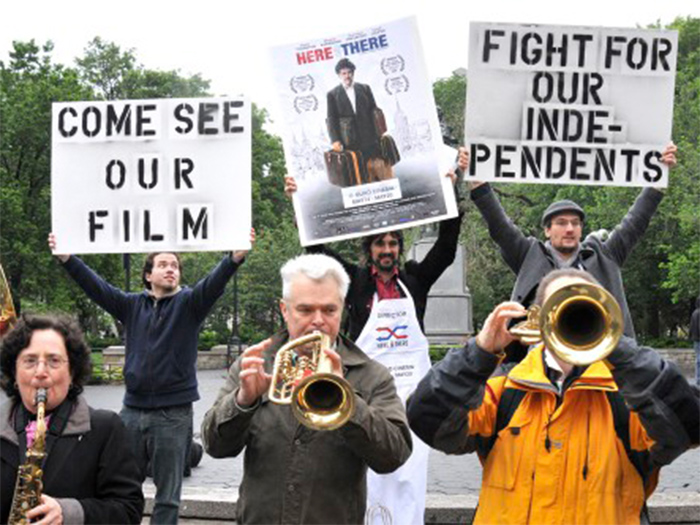CSI Alumnus George Lekovic (BA, Media Studies, ’04) is the main producer of Here and There, an award-winning film with parallels to his life. The movie recently finished brief runs at the Quad Theatre in Manhattan and Laemmle’s Music Hall in Los Angeles and is booked in 15 to 30 other cities.
Lekovic prefers filmmaking’s creative side, but became a producer “when I met Darko Lungulov [director and writer of Here and There] and I really wanted to make that project happen on the big screen.”
Art Reflects Life
In the film, a poor musician takes an offer to go to Belgrade to marry a Serbian immigrant’s girlfriend and bring her to New York for $5,000. The Belgrade-born Lekovic says, “In many ways, the film’s story is very similar to mine and of all of us who’ve come to New York City from elsewhere, seeking something better and bigger. We remain always split between our old home and our new home, between ‘here and there’.”
He sees “definite parallels” between himself and the main character. “Much like him, I came to New York and did whatever odd jobs it took to survive–mechanic at a vintage motorcycle racing shop…teacher of Italian. Now, like the other character in the film, I find myself going to Belgrade and feeling a little bit like a stranger there.”
Growing up in communist Yugoslavia, Lekovic says, “we’d been through a lot, especially in the early ’90s. So you don’t get spoiled or lazy, and it teaches you to be resourceful and get things done.”
When he got a call in 2008 from David Thornton (the film’s leading man), who was watching CNN coverage of the U.S. Belgrade embassy in flames, Lekovic assured him: “Oh, that’s quite normal. Happens often.”
However, it was serious business. Lekovic had flown into Belgrade with the U.S. crew and a month-old baby when other Americans were leaving the country. At the time, he says, making the film “seemed like a non-surmountable mountain, but in retrospect, that was the easy part.”
Drumming Up Support and Receiving Acclaim
As part of a “guerilla” marketing campaign, the film was trumpeted in Washington Square Park before its opening, with a surprise concert by the Balkan Brass Band, Zlatne Uste.
Despite his fim’s success, Lekovic fears there will be fewer and fewer low-budget independent films, more money going to blockbuster efforts, and the “American indie scene seeing more foreign films, since they’re made on mostly subsidized budgets and not subject to the mechanics of this, now mostly dysfunctional, market.” He urges support of the indie film “while you still can. It won’t be there much longer.”
The film team “loved” the awards that Here and There won at the 2009 Tribeca Film Festival and the more than 20 that followed. Gratifying, too, were reviews, “most better than positive…(though it ‘killed’ in a few), and good ones from important publications.”
He cites The Hollywood Reporter: “Elegantly minimalistic, superbly played and surprisingly feel-good, in the best sense of the word”; The New York Times: “Like slivovitz, it sneaks up on you”; and the Village Voice:”Unexpectedly sublime, like the odd intimacy of wearing gifted pajamas and a friendship forged over a two-liter of beer.”
The film was shot in New York City and Belgrade in 34 days. Backers included the city of Belgrade.
It was submitted by the Serbian Film Academy for a 2009 Oscar as Best Foreign Language Film but, because it is mostly in English, it was disqualified. Now, though, it is eligible for 2010 Oscar consideration in domestic categories.
The Importance of Perseverance
In filmmaking, the big satisfaction for Lekovic–currently preparing a film by Polish director, Lech Majewski, the youngest person to have a full retrospective at MoMa–is “the challenge of mounting the insurmountable, the kick you get when you beat the odds, the rush you have when you walk the thin ice. But now, I might like something more steady–a thicker ice perhaps.”
Although he a graduate of CSI’s Media Studies BA program and was making movies throughout college, “I also completed most of its MA coursework, heavily focused on philosophy and psychology, which I really liked.” Torn between academia and making movies, he chose the latter.
Because they were jobs that “could actually pay for rent and food,” Lekovic started editing and directing photography, although he wanted to direct and write. In 2007, he had his first directing job (along with directing photography) with Polycarp, a 35-mm feature film starring Michael Pare and Charles Durning.
While attending CSI, Lekovic first lived in Brooklyn, then moved to a room near the ferry in St. George. Between taking 24 credits and holding two jobs, he was sleeping only four hours a day, for a while on the floor without a mattress, and with his bathrobe as a blanket. He currently lives near his old Brooklyn neighborhood with his wife Ana and two-year-old daughter. Another child is due in two months.
Remembering CSI
A CSI magna cum laude graduate and winner of an Elliott Rubenstein Memorial award for academic excellence, Lekovic says: “At CSI, if you were ambitious at your schoolwork you had unrestricted access to wonderful, strong professors always eager to help curious and willing students.”
He thoroughly enjoyed “the professors, the library, the arts center’s screening room, the rides back and forth and the campus itself. Every day was a one big trip to the countryside for me.”
Among his pleasant memories are associate professor Jason Simon and his media culture production shop, and rides and profound philosophical discussions with cinema studies Professor David A. Gerstner after late night classes, “almost like an extracurricular activity.”
“I had a ball, and I’d do it all over again,” he declares, “despite many saying, ‘You should have gone to an ivy league school’.”



![[gallery] CSI Honors Employees of the Month](https://csitoday.com/wp-content/uploads/2012/11/employee-of-the-month.jpg)












